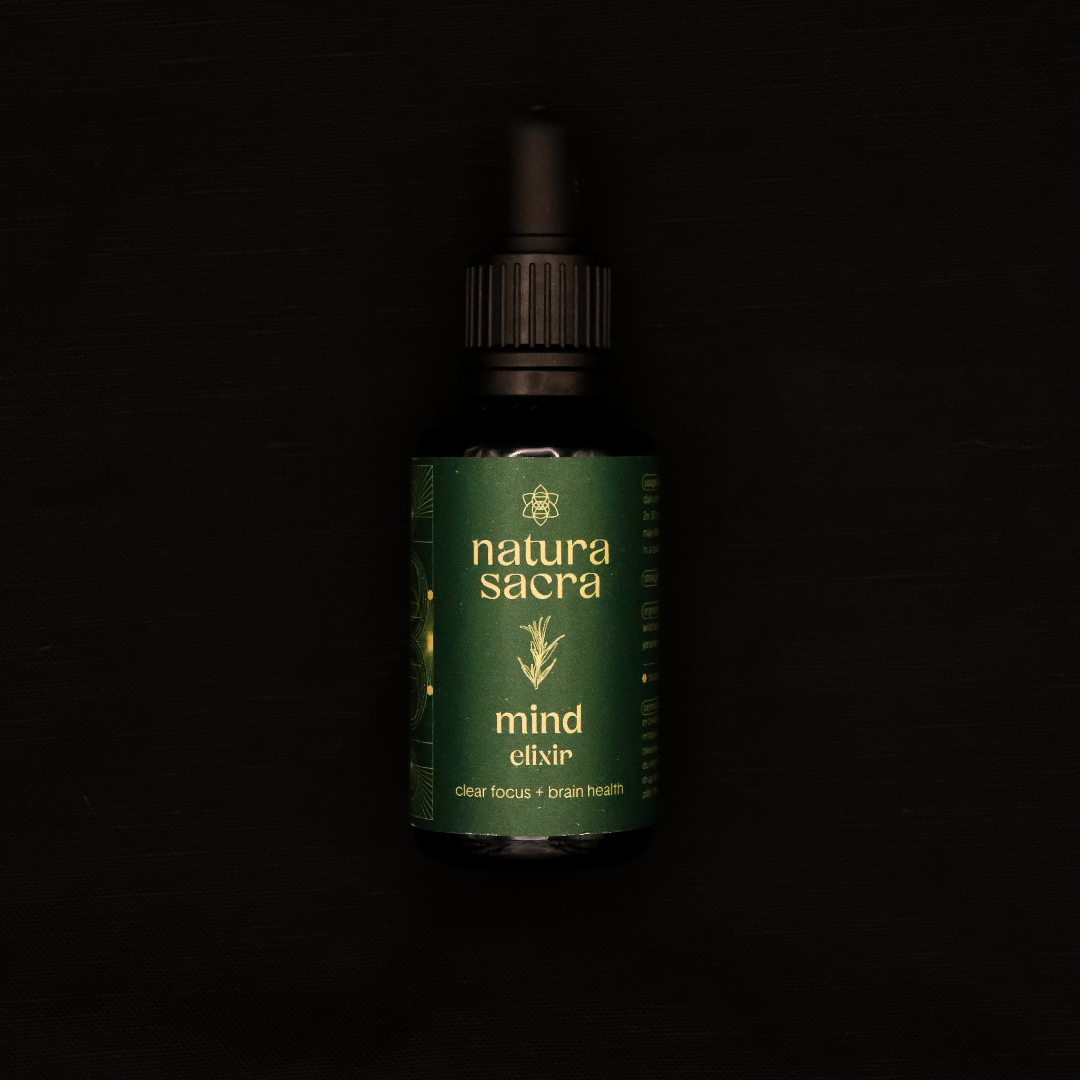Tired of waking up exhausted despite getting your eight hours? You're not alone. One in three American adults suffer from ongoing fatigue, affecting not just daily productivity but long-term health and emotional wellbeing. In this guide, we'll explore why sleep quantity doesn't always translate to quality rest, uncover hidden causes of morning fatigue, and share holistic strategies including nervine herbs, morning and evening rituals, and nervous system support techniques that can transform your relationship with rest.
What to Do When You Wake Up Tired: Nervine Herbs & Rituals for Rest

Understanding Nervous System Fatigue
That persistent morning fatigue you're experiencing might be more than just a bad night's sleep—it could be a sign of nervous system burnout. When you feel simultaneously wired and tired, struggle to get out of bed despite adequate sleep hours, or experience anxiety alongside exhaustion, your nervous system may be stuck in a stress response pattern.
Our nervous system operates in two primary modes: sympathetic (fight-or-flight) and parasympathetic (rest-and-digest). In our modern, high-stress world, many of us spend too much time in sympathetic activation—our bodies constantly preparing for threats that never materialise. This chronic activation depletes our energy reserves and prevents truly restorative sleep.
Even when we're physically still, an overactive mind keeps stress hormones like cortisol and adrenaline circulating, preventing the deep relaxation necessary for rejuvenation. Over time, this creates a cycle of chronic fatigue that conventional sleep advice doesn't address.
The vagus nerve—the longest cranial nerve in your body—plays a crucial role in activating the parasympathetic response. When properly toned, it helps your body shift from stress to relaxation, improving sleep quality and morning energy. Many of the practices we'll explore work directly to stimulate vagal tone, helping reset your nervous system's baseline from stressed to calm.
Understanding this fundamental imbalance is the first step toward addressing morning fatigue at its source. Rather than simply adding more hours of poor-quality sleep, we need to address the underlying nervous system dysregulation that prevents truly restorative rest.
Nervine Herbs for Gentle Awakening
Nervine herbs offer gentle yet powerful support for an overtaxed nervous system. These botanical allies help bridge the gap between exhaustion and vitality by nourishing your nervous system, reducing stress responses, and improving sleep quality without the side effects of pharmaceutical sleep aids.

The beauty of nervines lies in their dual action—they can both calm an agitated system and strengthen a depleted one. Regular use builds resilience against stress while promoting the deep rest necessary for morning vitality. Many herbalists recommend incorporating these plants as daily tonics rather than occasional remedies.
Key Nervine Herbs
Milky Oats (Avena sativa): Harvested when the oat tops exude a milky substance, this mineral-rich nervine nourishes depleted adrenal function and reduces anxiety. Particularly beneficial for those feeling "burned out," milky oats restore nervous system integrity over time.
Chamomile (Matricaria recutita): This gentle yet effective herb reduces inflammation, promotes relaxation, and improves sleep quality. Steep 1-2 teaspoons of dried flowers in hot water for 10 minutes before bed to experience its calming effects.
Lavender (Lavandula angustifolia): Beyond its pleasant scent, lavender reduces anxiety, improves sleep quality, and eases tension headaches. Add a few drops of essential oil to a diffuser in your bedroom or enjoy as an evening tea.
Lemon Balm (Melissa officinalis): This uplifting nervine reduces stress while supporting cognitive function—making it perfect for morning use. Enjoy as a tea in the morning for a gentle, clear-headed energy boost without the jitters of caffeine.
Skullcap (Scutellaria lateriflora): This powerful nervine reduces nervous tension and promotes relaxation without causing drowsiness. Take as a tincture or tea before bed to support deep, restorative sleep without morning grogginess.
Morning Rituals to Start the Day Right
Creating consistent morning rituals does more than just set a positive tone for your day—it helps regulate your circadian rhythm, signaling to your body that it's time to be awake and alert. These intentional practices create a buffer between sleep and the demands of daily life, allowing your nervous system to transition gracefully into activity.

Breathwork Exercises for Energy and Focus
Your breath is perhaps the most powerful tool you have for directly influencing your nervous system. When you're caught in the cycle of morning fatigue, strategic breathwork can shift your physiological state from exhaustion to energized alertness within minutes. These practices require no special equipment and can be done anywhere, making them perfect additions to your morning routine.
Breathwork works through multiple pathways—it increases oxygen flow to your brain and tissues, activates the vagus nerve to regulate your nervous system, reduces stress hormones like cortisol, and brings awareness to the present moment. Unlike caffeine, which often masks fatigue by stimulating an already depleted system, breathwork addresses the root imbalance.

Three Powerful Morning Breathwork Practices
Box Breathing: This technique balances the nervous system while improving focus and energy. Inhale for 4 seconds, hold for 4 seconds, exhale for 4 seconds, and hold for 4 seconds. Visualize tracing a square with your breath. Practice for 5-10 rounds to reduce morning stress and increase mental clarity.
Diaphragmatic Breathing: Place one hand on your chest and one on your belly. Breathe deeply into your belly, feeling it expand while keeping your chest relatively still. This activates the parasympathetic nervous system, reducing anxiety while increasing oxygen flow. Practice for 3-5 minutes to ground excessive morning energy or boost sluggish states.
Alternate Nostril Breathing (Nadi Shodhana): This yogic technique balances the hemispheres of the brain while calming the nervous system. Using your right thumb to close your right nostril, inhale through your left nostril. Then close your left nostril with your ring finger, release your thumb, and exhale through your right nostril. Continue alternating for 5-10 minutes to improve focus and energy without creating agitation.
For maximum benefit, practice one of these techniques for at least five minutes each morning before checking your phone or email. Pair with the nervine herbs mentioned earlier for a synergistic effect on nervous system regulation and morning energy.
Light Exposure to Regulate Circadian Rhythm
Light is the primary signal that regulates your body's internal clock. Strategic exposure to different types of light throughout the day can dramatically improve your sleep quality and morning energy levels. Our ancestors lived by the rhythms of natural light, and our physiology still responds powerfully to these cues, even in our modern environment.
Morning Sunlight
Expose yourself to natural sunlight within 30 minutes of waking. This morning light exposure suppresses melatonin production and triggers a healthy cortisol response, signaling to your body that it's time to be alert and energized. Aim for 10-15 minutes of direct sunlight without sunglasses for optimal benefit. If weather or seasonal darkness makes this difficult, a 10,000 lux light therapy lamp can provide similar benefits.
Daytime Light Patterns
Throughout the day, try to maintain exposure to bright natural light. Working near windows, taking outdoor breaks at lunch, and spending time in well-lit environments helps maintain proper circadian signaling. This daytime light exposure not only improves immediate energy and mood but also sets the stage for better sleep that night.
Evening Light Management
As evening approaches, begin reducing exposure to blue light, which suppresses melatonin production. Wear blue light blocking glasses after sunset, use apps that filter blue light on devices, and switch to warmer lighting in your home. These adjustments allow your body to produce melatonin on schedule, preparing you for deep, restorative sleep.
For those in northern climates or working night shifts, light therapy lamps can be essential tools. These specialized devices emit 10,000 lux of light (compared to average indoor lighting of 300-500 lux) and can help reset disrupted circadian rhythms when used for 20-30 minutes each morning. Consistent light management may take a few weeks to significantly impact morning fatigue, but the cumulative effects on sleep quality and energy levels can be profound.
Gentle Movement to Wake Up the Body

When fatigue weighs heavily, vigorous exercise might seem impossible. However, gentle movement actually creates energy through improved circulation, endorphin release, and nervous system regulation. The key is choosing movement that energizes rather than depletes your already taxed system.
Morning movement serves multiple purposes: it increases blood flow to muscles and brain, releases mood-enhancing endorphins, reduces muscle stiffness from sleep, and helps regulate cortisol patterns. Even five minutes of intentional movement can shift your energy state and set a positive physical tone for the day ahead.
Gentle Morning Movement Practices
Morning Stretching Sequence: Begin with gentle full-body stretches that target areas that commonly hold tension overnight. Cat-cow poses mobilize the spine, gentle twists release back tension, and slow hamstring stretches improve circulation to the lower body. Hold each stretch for 30 seconds while focusing on deep, steady breathing.
Mindful Yoga Flow: A gentle sequence of 5-10 sun salutations provides full-body movement without excessive exertion. The rhythmic nature of this practice coordinates breath with movement, calming the mind while energizing the body. Focus on fluid transitions rather than holding challenging poses.
Nature Walking: A 20-30 minute walk, ideally in natural surroundings, combines the benefits of movement with exposure to natural light and grounding connection with the earth. Walking meditation—focusing on the sensations of each step—adds a mindfulness dimension that further regulates the nervous system.
Evening Rituals for Deeper Sleep & Nervous System Reset
While morning routines set the tone for your day, evening rituals determine the quality of your sleep and nervous system recovery. Creating a consistent wind-down sequence signals to your body that it's safe to release the vigilance of the day and prepare for deep restoration.
Herbal Tea Ritual
Create a calming herbal blend using nervine herbs like linden flower, chamomile, and skullcap. Prepare this tea 1-2 hours before bed, sipping slowly while avoiding screens. The ritual itself—the warmth of the cup, the aromatic steam, the act of pausing—signals to your nervous system that the day is complete. These specific herbs gently calm an overactive mind without causing morning grogginess.
Self-Massage Practice
Using a calming herbal oil like lavender or chamomile-infused oil, practice a simple self-massage focusing on areas that typically hold tension. Pay special attention to the feet (which contain numerous nerve endings), the temples, the base of the skull, and the shoulders. This practice not only releases physical tension but also activates the parasympathetic nervous system through touch.
Pre-Sleep Breathwork
Practice the 4-7-8 breathing technique developed by Dr. Andrew Weil: inhale quietly through your nose for 4 seconds, hold your breath for 7 seconds, then exhale completely through your mouth for 8 seconds. This extended exhale activates the vagus nerve, lowering stress hormones and preparing your body for sleep. Repeat for 4 cycles before bed.
Additional evening practices include a 10-minute tidying ritual to create a peaceful environment, a gratitude journal to process the day's events, and complete digital disconnection at least 30 minutes before sleep. The most important aspect is consistency—your nervous system responds to predictable patterns that signal safety and the opportunity for deep rest.
Optimizing Sleep Environment
Your bedroom environment directly impacts the quality of your sleep and, consequently, how you feel upon waking. Even with perfect sleep habits, a suboptimal sleep environment can prevent the deep, restorative sleep necessary for morning vitality. Creating a sleep sanctuary requires attention to multiple sensory elements—temperature, light, sound, touch, and air quality.
The human body is exquisitely sensitive to environmental cues during sleep. Our ancestors slept in caves and natural shelters—dark, quiet, and cool environments that supported deep rest. Recreating these conditions in our modern bedrooms can dramatically improve sleep quality even without changing sleep duration.

Key Elements of an Optimal Sleep Environment
Temperature Regulation: Keep your bedroom cool, between 65-68°F (18-20°C). Your body temperature naturally drops during sleep, and a cooler room facilitates this process. Consider seasonally appropriate bedding that can be layered or removed as needed, and ensure adequate air circulation. If temperature control is challenging, cooling mattress toppers or warming devices for winter months can help maintain optimal sleeping temperature.
Complete Darkness: Install blackout curtains or use a high-quality sleep mask to eliminate all light sources. Even small amounts of light—from electronics, street lamps, or early morning sun—can disrupt melatonin production and prevent deep sleep phases. If you need a night light for safety, choose red-spectrum lighting, which has minimal impact on melatonin levels.
Sound Management: Address noise pollution with earplugs, white noise machines, or sound-dampening modifications to your bedroom. Unexpected or intermittent noises are particularly disruptive to sleep quality. Some people benefit from specific sound frequencies designed to enhance delta brain waves associated with deep sleep.
Comfortable Bedding: Invest in a supportive mattress and pillows appropriate for your sleep position and body type. Natural materials like cotton, wool, and latex generally offer better temperature regulation and fewer potential allergens than synthetic options. Regularly washing bedding removes accumulated allergens that may disrupt breathing during sleep.
Air Quality: Use an air purifier with a HEPA filter to remove allergens, pollutants, and dust that can impact breathing and sleep quality. Houseplants like snake plants and peace lilies naturally filter air and add moisture. Maintaining humidity between 40-60% supports clear breathing and prevents the drying of mucous membranes that can lead to snoring or throat irritation.
Natura Sacra Product Recommendations
While developing your personal sleep and energy rituals, certain carefully formulated products can support your journey toward balanced rest and vibrant mornings. Natura Sacra offers several botanical formulations specifically designed to address nervous system fatigue and sleep quality using the healing herbs we've discussed throughout this guide.
Deep Sleep Tea
This expertly blended herbal sleep formula combines traditional nervine herbs that work synergistically to quiet an overactive mind and prepare the body for restorative sleep. Lemon balm calms mental chatter, hawthorn supports heart-centered relaxation, and mugwort encourages vivid but peaceful dreams. Each ingredient is organic, sustainably harvested, and carefully dried to preserve its therapeutic properties. Enjoy 1-2 cups 30-60 minutes before bedtime as part of your evening wind-down ritual.
Inner Relief Elixir
This adaptogenic tincture provides daily support for a stressed nervous system, helping you maintain equilibrium during challenging times. The concentrated blend of lemon balm and lavender delivers potent nervine compounds in a convenient format, perfect for those moments when stress threatens to overwhelm. Add 20 droppers to water or tea, up to three times daily, especially during periods of increased stress or when recovering from nervous system depletion.
Mama's Love Body Oil
Transform your evening self-massage practice with this therapeutic body oil infused with calming botanicals. The base of organic sunflower oil carries the relaxing properties of rose, chamomile, and rose essential oil into tissues, releasing physical tension while soothing an agitated mind. The ritual of application itself becomes a moment of self-care, signalling to your nervous system that it's time to transition from doing to being.
These thoughtfully crafted products complement the practices outlined in this guide, offering convenient access to the healing power of plants. As you explore what works best for your unique body and circumstances, these formulations can provide reliable support for your nervous system and sleep quality, helping transform your relationship with rest and morning energy.
A Holistic Approach to Rest
The path to waking refreshed begins long before you lay your head on the pillow. As we've explored throughout this guide, true restoration requires a holistic approach that addresses the underlying causes of fatigue—particularly nervous system dysregulation. By combining the gentle power of nervine herbs with intentional rituals, mindful breathwork, strategic light exposure, and supportive movement, you create a comprehensive framework for deep rest and vibrant mornings.
Remember that consistency matters more than perfection. Rather than trying to implement all these practices at once, choose one or two that resonate most strongly with your current needs and lifestyle. As these become habitual, gradually incorporate additional elements. Small, sustainable changes often yield more lasting results than dramatic overhauls that prove difficult to maintain.
Pay attention to how your body responds to different practices. We each have unique constitutions, life circumstances, and sources of stress that influence what works best for us. The practices that feel most nourishing and produce noticeable improvements in your morning energy deserve priority in your routine. Trust your experience as you customize these approaches to your specific needs.

The relationship between rest and vitality extends beyond immediate symptom relief to impact your long-term health. Quality sleep strengthens immune function, supports cognitive performance, balances hormones, and reduces inflammation. By prioritizing rest, you're making an investment in your future wellbeing that will compound over time.
Finally, bring compassion to this process. In a culture that often glorifies busyness and productivity at the expense of rest, choosing to prioritize your sleep and nervous system health is a radical act of self-care. Honor the wisdom of your body's need for true restoration, and recognize that the energy you cultivate through proper rest allows you to show up more fully in all areas of your life.
With patience and persistence, you can transform your relationship with sleep and reclaim the joy of waking refreshed, alert, and ready to embrace each new day with presence and vitality.







